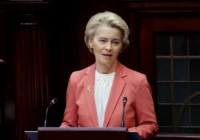In November, EU foreign ministers adopted the civilian CSDP Compact, but it falls short of putting EU civilian crisis management on a new footing.
With its 10 ongoing civilian and six military Common Security and Defense Policy (CSDP) missions, the European Union is engaged in zones of conflict and instability from the Horn of Africa and the Sahel to the Middle East and Eastern Europe. In their Pathways to Peace report, the United Nations and the World Bank assess that there are three times the number of violent conflicts in 2018 than there were in 2007. Thus, there is a need for more crisis management, not less.
Yet the civilian CSDP, in particular, has been facing a decrease in interest and a lack of commitment from member states since the Treaty of Lisbon entered into force in 2009. In fact, the EU civilian missions’ total staff size has been reduced by three times in the last eight years. So, it is high time to revisit approaches and instruments on the EU side and update them for the future. Unfortunately, the newly adopted civilian CSDP Compact reflects the common difficulty of achieving a compromise with substantial results when dealing with 27 member states.
Indeed, the EU foreign ministers have now agreed to a civilian CSDP Compact that “should lead to a more capable, more effective, and more joined up civilian CSDP.” Following the launch of the EU Global Strategy in 2016, the European Council was already calling for a revision of civilian CSDP priorities. The main purpose was to better adapt to evolving security needs.
However, the new compact instead contains well-known lists of security challenges that the broader EU response should help to tackle, namely “those linked to irregular migration, hybrid threats, cyber security, terrorism and radicalisation, organised crime, border management and maritime security, as well as preventing and countering violent extremism, also taking into account the need to preserve and protect cultural heritage.” Thus, it has fallen short of delivering a systematic assessment of related threats and their linkages to broader instability and conflict.
Internal and external security agendas have not been aligned
Although the challenges mentioned are real, internal and external security agendas have obviously not been aligned. Certain threats, such as those related to irregular migration — not surprisingly the first on the list — might, thus, be tackled in a rather ad hoc way and from a more inward-looking point of view by EU member states.
In the past, operations on the ground used to be more focused on stabilization and peacebuilding efforts, but are now increasingly advising partner governments on border control and migration management. For example, the mandate of the civilian EU Capacity Building Mission (EUCAP) Sahel Niger and EUCAP Sahel Mali became part of the overall effort of the EU Migration Partnership Framework in 2016.
At best, it remains unclear whether this framework is in line with the key objective of stabilization the EU has set out for the region. A more integrated approach is clearly necessary, but it has not been laid out in the new compact. Cooperation or integration with actors of justice and home affairs and a new focus of CSDP on domestic issues, which were the controversial core of the concept for the compact in early 2018, have been toned down and almost completely erased from the final document. Instead, member states underline that the “Feira priority areas” from 2000 remain the basis of civilian CSDP.
Against this background, the extensive list of threats that civilian CSDP is supposed to respond to — in concert with other EU instruments — may create expectations that are too high concerning what the instrument will be able to deliver in areas of instability. Moreover, not all challenges on the list may be primary areas for European civilian crisis management — maritime security, for example, has been mostly dealt with by military missions.
The Permanent Structured Cooperation on Defense (PESCO) and the compact processes seem instead to cement the divisions between military and civilian actors in the EU. Enabling joint civil-military CSDP missions — instead of deploying them in parallel — would have been a major breakthrough for European crisis management, but they are not conceivable any time soon. What is at least needed in this situation is a clearer profile of what CSDP can contribute to civilian crisis management.
Civilian crisis management needs real commitment and partners
It may be an added value that all EU member states agreed to the compact. CSDP — which is per se a very political tool — needs to balance various interests, and governments want to stress its usefulness, also internally. At the same time, the compact lacks ambition. Initially, it strived to create substantial new commitments from member states, similar to the projects under PESCO in 2017. Yet many measures outlined in the final document are rather limited, such as bringing the new core responsiveness capacity (which constitutes the first wave of deployed personnel) from 30 up to 50 people. Nevertheless, the compact may still translate into concrete steps forward for the civilian CSDP. Three aspects should be considered.
 First, the German commitment to provide tangible support to the compact through the establishment of a new European center of excellence for civilian crisis management, which was announced on the day of the European Council decision, can hopefully trigger stronger contributions from other member states. In the process leading up to the joint action plan for the compact, to be presented in spring 2019, Germany should, thus, closely consult with those countries with a particular interest in civilian CSDP. Overall, member states need to come up with clearer, substantial commitments and serious national implementation plans for the compact.
First, the German commitment to provide tangible support to the compact through the establishment of a new European center of excellence for civilian crisis management, which was announced on the day of the European Council decision, can hopefully trigger stronger contributions from other member states. In the process leading up to the joint action plan for the compact, to be presented in spring 2019, Germany should, thus, closely consult with those countries with a particular interest in civilian CSDP. Overall, member states need to come up with clearer, substantial commitments and serious national implementation plans for the compact.
Second, at the operational level, the priority of building the capacities of partners has to go beyond offering advice, training and equipment as part of CSDP missions. Rather than following a mostly technical approach, political guidance is crucial for EU civilian crisis management. The compact process will need to give an answer as to how this can be provided, in light of an ever increasing set of EU actors and instruments on the ground, as well as the potentially diverging demands and priorities of local partners in (post-)conflict situations.
Finally, the somewhat self-occupied EU needs to broaden its focus. The compact should be aligned with relevant partnerships, as they are briefly mentioned in the compact itself. There are existing policy frameworks, such as the UN-EU priorities of the strategic partnership on peace operations and crisis management for 2019-2021, that were set out in July 2018 and need to be taken into account.
*[This article was originally published by the German Institute for International and Security Affairs.]
The views expressed in this article are the author’s own and do not necessarily reflect Fair Observer’s editorial policy.
Support Fair Observer
We rely on your support for our independence, diversity and quality.
For more than 10 years, Fair Observer has been free, fair and independent. No billionaire owns us, no advertisers control us. We are a reader-supported nonprofit. Unlike many other publications, we keep our content free for readers regardless of where they live or whether they can afford to pay. We have no paywalls and no ads.
In the post-truth era of fake news, echo chambers and filter bubbles, we publish a plurality of perspectives from around the world. Anyone can publish with us, but everyone goes through a rigorous editorial process. So, you get fact-checked, well-reasoned content instead of noise.
We publish 2,500+ voices from 90+ countries. We also conduct education and training programs
on subjects ranging from digital media and journalism to writing and critical thinking. This
doesn’t come cheap. Servers, editors, trainers and web developers cost
money.
Please consider supporting us on a regular basis as a recurring donor or a
sustaining member.
Will you support FO’s journalism?
We rely on your support for our independence, diversity and quality.






